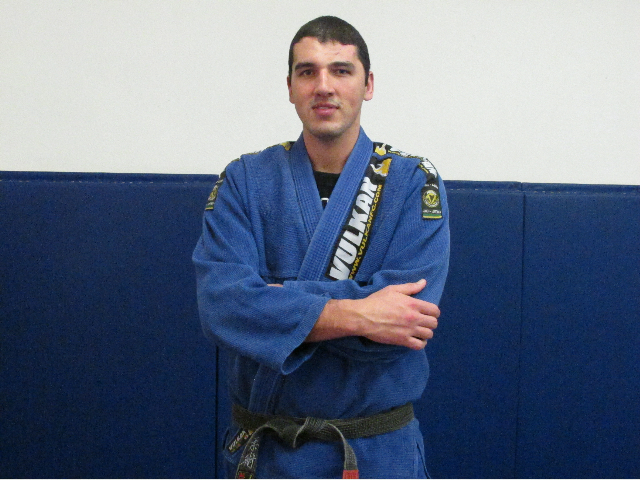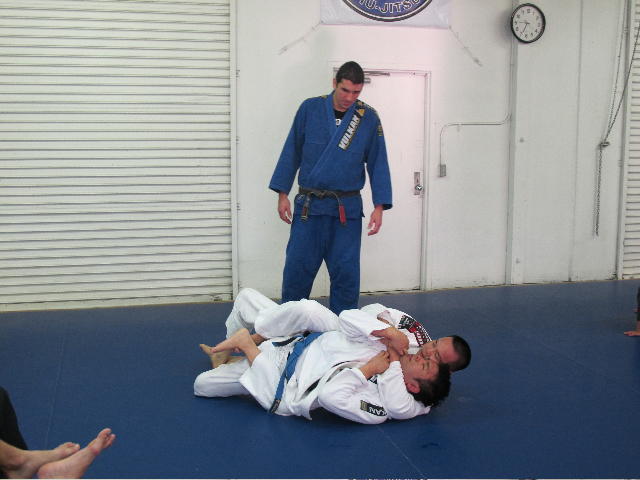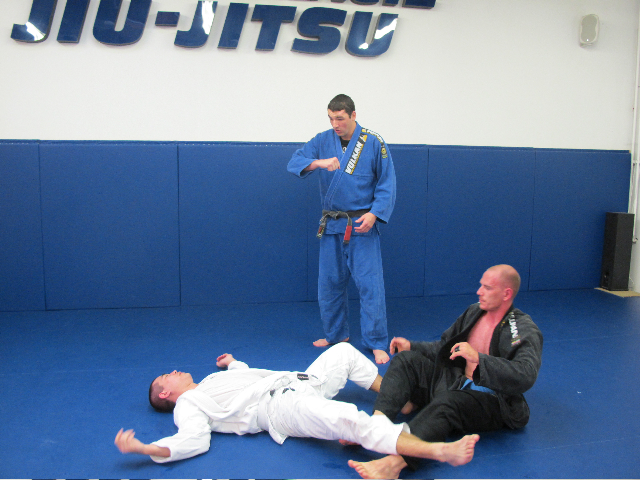Bruno “Mamute” Paulista was only 15 years old when he lost his father to a fatal heart attack. It really took a toll on him, his mom, and his brother. Bruno’s dad was only 38. “I was close with my dad,” Bruno says, “It was really painful for me. My dad was tough, but we were very close. Every Saturday, he and I used to get together and do things together.”
After Bruno’s dad passed away, he didn’t have time to grieve. He had a little brother who was five years younger than him and a now-single mom to think about, since he was the oldest “man” in the home. “My brother really started to miss a man in the house,” Bruno says, “I tried to take over that role for him.”
As Bruno began to move forward in his life, he found his heart yearned for the direction and discipline his father had always provided. In his hometown of Brasilia, he had two friends who were Jiu-Jitsu blue belts. They convinced him that the gentle art was what he needed to fill the void. At first, his mother did not back him in his desire to get involved in the sport, so he set out to find a school and professor she would support.
“I found a nice Jiu-Jitsu place and I showed my mom,” Bruno says, “Professor Deo was an ex-general in the Army. He was a 72-year-old black-and-red belt. He was a disciplinarian, which was good for me. My dad was really tough – a good tough, so to have a master like that, too, was great. Professor Deo was such a good person. He joked around, but not on the mats. He was really serious on the mats. He taught me how to control myself and how to deal with life.”
As time passed, Bruno became quite successful in Jiu-Jitsu, as a student, competitor, and businessman. Bruno trained under Professor Deo until he was a purple belt, then began training under Alexandre Souza of Gracie Florianopolis, eventually receiving his black belt from him.
In time, Bruno opened his own martial arts academy that featured both Jiu-Jitsu and Muay Thai. It had a second floor for dance and yoga. Bruno was also studying Physical Education in university. Life was going well for him. In 2007, he came to the U.S. to compete in the Pan, and found that he didn’t want to go back to Brazil. “I was supposed to go home in August,” Bruno says, “But I liked it here. Everything changed. All these opportunities opened up for me.”
One of Bruno’s Florianopolis black belt friends referred him to Ralph Gracie. “Ralph needed someone to help him teach,” Bruno says, “I had no intention of doing it because I had my own academy in Brazil, but once we spoke, I agreed to stay.”
After living in Ralph Gracie’s academy in Placentia and teaching at his school for eight months, Bruno decided to apply for a work visa. “I got my work visa for five years,” he says, “I went back to Brazil in February 2008 to see my academy. I had an apartment there as well. I put everything up for sale and came back to the U.S.”
In 2009, Bruno became very focused on MMA. Although he’s a very skilled gi fighter, Bruno’s game is really good for no-gi. He’s a No-Gi Worlds and Pan champion and was a silver medalist in the 2010 No-Gi Worlds.
In January 2009, Bruno’s good friend Babalu Sobral asked him to be his corner coach for his Affliction: Day of Reckoning fight against Rameau Thierry Sokoudjou. “I was really excited,” Bruno says, “After the fight, I decided that I wanted to fight MMA, too, so I started to train for it.” Bruno had his first professional MMA fight against Aleksandr Sukhonosov on the Long Beach Fight 5 card on July 19, 2009. He won with a rear-naked choke.
“I loved that fight,” he reminisces, “I was calm. The guy was busy striking. I tried to take him down. In the 2nd round I tried to take him down again. I choked him out in the 3rd.” Bruno was slated to have another fight in November, but he says he started to think about business, put the fight on hold, and bought an academy instead. Bruno now owns the very successful Ralph Gracie Academy in Anaheim, CA.
Bruno applied for a green card in November 2009 and in 2010 it was approved. “I decided to go to Brazil to visit my family,” Paulista says, “My grandma had just passed away and I wanted to pay my respects. I was supposed to go for 10 days.”
On April 23, 2010, the 7th day of his trip, Bruno’s life was forever changed. “I was at a restaurant for my friend’s birthday,” he recalls, “I was driving home by myself in my friend’s car.” As is typical of the tropical weather in Brazil, it was warm outside, and then it began to rain, making the roads slippery and wet.
“I made a left curve and the car slid to the right,” Bruno recollects, looking down at his hands as if the steering wheel was still attached to them, “The car was a manual speed. I pulled back to the left, but too much. I hit the sidewalk and then a post. The post hit right at my door.”
Bruno’s accident occurred in a downtown section of town, but there was another car accident that happened on a hill in a different location, but on the same night, in the same make of car, and close in color. “That guy went over the hill and died,” Bruno says, “There was a lot of confusion. Everyone thought it was me who died in the crash.”
Bruno says it could have easily been him who perished that night. “I’m a really lucky guy,” he says, “My brain was saved.” His skull was damaged when the post hit his car, though. He had his first surgery in the ICU to clean it out and fix it. For the first four days, Bruno was put in an induced coma to give him the best chance for survival. “My first day, they gave me a 30% chance of survival,” he smiles wistfully, “My second day, they gave me a 50%, my third day, they gave me 70%, and on my fourth day, they gave me a 95% chance.”
Bruno’s recovery was long and arduous, but because of his superior fitness level, and his attention to his diet, he recovered quickly. He was in the hospital for 50 days and underwent reconstructive surgeries, physical therapy, and mental therapy to try to overcome the effects of such a violent accident. “At first I laid in bed all the time, walking sometimes,” he says, “I tired easily and my balance wasn’t the greatest, but after two weeks of doing physical therapy, I was on my way back to being 100%.” Bruno says his recovery went so well, the doctors would see him and say, “I can’t believe it! It’s only been 3 ½ months, but you look like you’ve been recovering for eight months!”
The most difficult part of the accident for Bruno was watching his family suffer emotionally through his convalescence. “My mom and I are really, really close,” he says, “My biggest riches are my family. I suffered a lot seeing what my mom and brother went through during my recovery.”
Bruno says one good thing he learned during his recuperation was who his real friends were. Professors Ulpiano Malachias, Filipe “Jerry” Oliveira, Babalu Sobral, Fabio “Gigante” Villela, and Romulo Barral, to name a few, came to his school and taught his students during his absence. “My purple belt Benny Dariush would do the warm-up and the professors taught the techniques,” he says, “I talked to Benny everyday. He’s like my brother. He’s my family.”
While Bruno was away, his students started a website in his name and made him get well posters, signing them with love and well wishes. Bruno was in the hospital from April to June. “I got back to California on July 19th,” he says, “I’m so thankful to my family and friends for their help while I was gone. It was really, really important to me.”
At this point in his recovery, Bruno says he’s at about 85% and is working diligently to be back at 100%, which, according to his doctors, is an attainable goal. He can’t train in Jiu-Jitsu yet, because they don’t want him hitting his head in any way, but he is back to teaching Jiu-Jitsu full-time. “I still have to have regular MRI’s to monitor my progress,” he says, “The doctors are seeing how I’m coming along. I’m still doing physical therapy, working out to make my body stronger, and I’m going to the chiropractor regularly.”
As for MMA, Bruno says he can’t train Muay Thai yet under his master, Rafael Cordeiro, but he’s looking forward to the day he’s allowed to start. “It makes me feel good to be back, ready to do everything I did before the accident,” he says.
Bruno says he’s looking forward to his future with gratitude and hopefulness. “I’m happy to be back,” he says, “I’m readjusting, but I’m feeling really, really good. Couldn’t be better. I’m on the right road. I have my students, my friends, and my family’s support. I’m ready and set up. I can’t wait to fight again!”
Bruno’s proven time and time again that he is a born fighter with a lot of heart.



